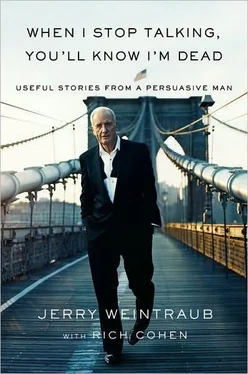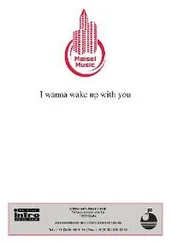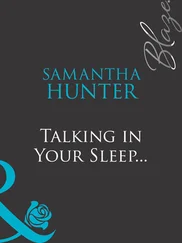"Okay. Good."
A few months later, my father and mother did indeed get an invitation from the White House. It was for a state dinner honoring the president of Austria, which made sense, as my father's family originally came from Austria. I had told my father none of this, so he was naturally puzzled by the invitation. After talking to my brother, he finally decided, "You know, I bet Jerry has something to do with this."
He called me and asked, "Jerry, if I go to this thing, do I sit next to your mother at dinner?"
"No," I said. "They separate everyone. It makes for better mixing."
"Mixing," he said. "Mixing I don't need. I am not going if I can't sit with your mother. I mean, what's the point if we can't be together?"
"All right," I said. "Let me make a phone call."
I talked to the people at the State Department. It went against protocol, but I got them to seat my parents next to each other.
Before the dinner, they went though the receiving line to meet the president and first lady. As my father walked up, a man whispered in Rosalyn Carter's ear: "Sam and Rose Weintraub-Jerry Weintraub's parents."
The first lady gave them a tremendous welcome. "Oh, my golly, it's so good to meet you. Your son is one of our favorite people. Our son Chip is with him right now in Beverly Hills. Isn't that funny? He's with our son, and we're with his parents."
She called to the president, saying, "Jimmy, look, these wonderful people are Jerry's mother and father!"
Jimmy Carter said to my father, "Oh, we like your son, he's such a nice guy."
After the dinner, my parents were taken home in a town car. Along the way, my father, spotting a pay phone, asked the driver to pull over. He got out and called my brother-not me, but Melvyn!-and said, "You are not going to believe this, but your brother really does know the president."
One day, years ago, when I arrived at work, I spotted a Hasidic Jew in the hall outside my office. These are the guys in the black coats with side curls and beards. This particular rabbi was a Lubavitcher, part of the group from Crown Heights, Brooklyn, who believe their rabbi, Menacham Mendel Schneerson, might be the Messiah. The followers of the Rebbe are devout. Rather than merely study and pray, they want to heal the world, do good work, invest even the smallest errand with a kind of godliness. I don't know all the particulars, but it's hardcore Hebrew, whiskey straight from the jug, no mixers, no water, radically different from my own casual American Judaism, which is practiced in a synagogue designed by modern architects.
I ducked in a side door unseen, walked into my office, got behind my desk, went to work. My secretary came in with the call sheet. As I looked it over, she said, "Do you know there's a rabbi outside waiting to see you?"
"Yes," I said. "I'm aware."
"Well," she asked, "do you want to talk to him?"
"No," I said, "I don't."
"What should I tell him?" she asked.
"Here," I said. "Hand me a pen."
I wrote out a check for ten thousand dollars.
"Give him this," I said. "Tell him I'm too busy to talk, but take the money and good luck."
I would gladly have paid ten grand just to avoid one of those maddeningly circular discussions you have with rabbis.
A few minutes later, my secretary came back. "He said he doesn't want the check," she told me.
"He doesn't want the check?"
"No," she said. "He needs to talk to you, and claims it has nothing to do with money."
Now I was interested, genuinely curious. I mean, those guys never turn down a check! "All right," I said. "Send him in."
He came in and sat down. I got a look at him. I had only noticed his clothes, but now I could see that his face was intelligent and warm. (This, as I then learned, was Schlomo Cunin, who is still my rabbi.) It tells you about judging from a distance, based on generalities. I mean, there are the clothes, then there is the face; there is the face, then there is the brain; there is the brain, then there is the soul. He had a good soul. We're friends to this day. He brings me a fresh challah every week.
"What's going on?" I asked. "You don't want my check?"
"I don't need the check," he said. "I need help. I've got a problem. The check won't fix my problem."
"What's your problem?"
"I owe eight million dollars."
"You owe what?" I said. "If you think I'm going to give you eight million dollars, you're crazy."
"We don't want money," he said. "We want you to help us solve our problems."
"What do you mean, 'We'?" Who sent you here?"
"The Rebbe."
"Who's the Rebbe?"
"Menacham Mendel Schneerson. The Hasid. The leader of the Lubavitchers. He said, 'Go see this Weintraub. He is going to help us. He is going to do the work of God.' "
I sat there, dumbstruck. I looked into my coffee cup. Half full. I looked out the window. The streets were swollen with morning traffic. "It's too early for this," I said. "I'm not going to do what you want me to do, whatever that is. Just take the check and go."
He left without the check.
Time passed. Hammer and I were planning a trip. A few days before we left, I got a call from George Bush. He was then vice president. He wanted to talk. We met for lunch.
"I understand you and your friend Armand are going to Moscow," he said.
"Yeah," I said, "we're leaving in a couple of days."
"Good," said Bush. "I want you to look up a friend of mine. His name is Demachev. He is going to be important. I think you will find him interesting."
This was in the 1980s. Thousands of Jewish refuseniks were trapped in Russia. These were critics of the regime who had spoken too volubly or too well. I had gotten a list of the names and addresses of the most prominent. I planned to visit them all. This was on my mind as I planned the trip.
I went home, packed, got into bed. We were leaving early in the morning. I turned on the TV and flipped around. I happened on a cable access channel I'd never noticed before. The picture was grainy and washed out, a synagogue seen through a stationary camera. The hall was filled with hundreds and hundreds of men in black coats and hats listening with rapt attention to a bearded man. He was speaking Yiddish, his words translated into English in subtitles on the bottom of the screen. I suddenly realized that this was the Rebbe of Crown Heights. Next I realized he was talking about me. I'm not exactly sure how I realized this. He never mentioned my name or anything like that, it was just clear. "An important trip will take place tomorrow," he said. "A Jewish businessman will travel to Russia. He plans to carry the names of refuseniks in his lapel pocket. Do not do this, sir. Do not put yourself in danger. We will take care of the refuseniks. You do your business, then come home. You are needed for more important work here."
We went to Russia. I had my meetings, met with the Russian official, spoke with the refuseniks, then flew back. When we landed at LAX, I had a pain. It was terrible. I could not stand to walk off the plane. I was rushed to the hospital. Nurses and doctors stood above me, talking, poking me with needles. I was being rushed into surgery. Then, suddenly, the Hasidic Jew who I had seen in the hall outside my office was over me.
I looked up, blinked hard, looked again. I couldn't believe it.
"Rabbi?" I asked.
He put a dollar bill in my hand and said, "The Rebbe sent me. He says everything is going to be fine. He needs you here to do God's work."
As they rolled me into the operating room, I called back, almost screaming, "Yes, Rabbi, yes! If you get me out of here, I will do God's work!"
Later, in the recovery room, I found the dollar bill folded on the side table. I thought a lot about the Rebbe, faith, God. I am not an obvious target for the Lubavitchers. I am not religious. I don't obey all the laws. I go to synagogue twice a year. Pork and lobster came into my world as soon as my grandparents left it. I am not strictly observant, but I felt an intense spiritual connection to the Rebbe. The things that happened-that cable access show, the sudden illness, the dollar bill-were unexplainable, and I did not want them explained. I treasured the mystery.
Читать дальше

![Сьюзан Кейн - Quiet [The Power of Introverts in a World That Can't Stop Talking]](/books/33084/syuzan-kejn-quiet-the-power-of-introverts-in-a-wo-thumb.webp)










